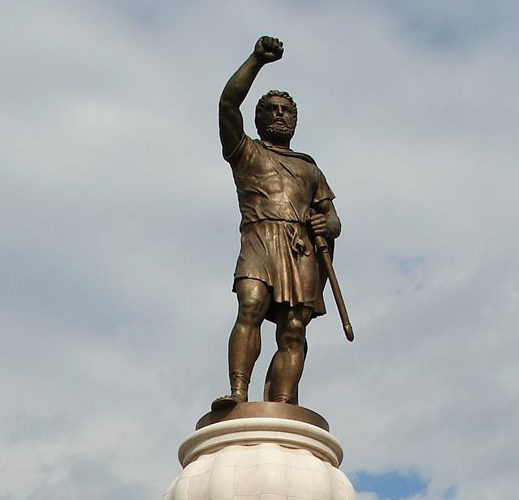Welcome to yet another one episode of the “Rise and fall of the Macedonian Empire”. We know Philip already as the king-warrior, genious strategist and politic, great diplomat. Today to all of those titles we will add also Champion of Apollo.
The Third Sacred War broke in Greece around 356 B.C. The Phocian Confederation refused to pay the fines putted on them by the Amphictonic League- a religious organization controlling the Temple of Delphi, the most sacred place in Greece. The League was currently led by Thebans, the sworn enemy of the Phocians. In response the Phocians seized the temple and plundered it’s treasuries, allowing them to rise a powerful mercenary army. This pushed the Amphictonic league, to declare The Sacred War.
The war started well for the Confederation, but after some weeks their leader Philomeos died in a battle, allowing his brother Onomarchus to take a lead.
Having powerful armies Onomarchus was finally able to take his first steps. He sent a small force into Thessaly- one of the most important League member. Thessalians facing destruction asked their ally Philip II of Macedon for help. Philip marched into Thessaly, as well as the rest of the Phocians forces. Thanks to clever use of catapults, Phocians strucked two massive losses on the Macedonian’s forcing them to withdrew for the time being.
Next year Philip returned into Thessaly, gathering both Macedonian and Thessalian soldiers. Yet he was not alone in this goal. For the aid of the Phocians the powerful Athenian army marched there seeing opportunity to struck a major blow against Philip. The Macedonian king trying to prevent enemy forces from uniting, he pushed his men into a long and exhausting march which ended by the battle on Crocus Fields.
Philip sent his men into battle wearing crowns of laurel, the symbol of the Apollo, as he announced loudly that he is an Avenger of the Gods. Seeing this many of the Phocians mercenaries surrendered or fled out of the battlefield Phocians met heavy casualties during battle. Half of their forces including Onomarchus were captured or dead. All the prisoners were drowned or crucified, as the custom for temple-robbers.
After his victory Philip was appointed Archon of Thessaly, giving him lifelong power over a powerful confederation. Still it was not an end to the Sacred War, and Philip had no intentions of ending it on foreign terms. Therefore he was not advancing into central Greece for the time being. Instead he marched into Thrace once and for all crushing all the resistance and turning most of the Thracians kings into Subject Allies.
During the same time the Chalkidian League, ally of Macedon, seeing growing power of Philip, tried to establish a treaty with Athens, breaching terms of their former truce with Philip. That was the sign of their near end. In 349 B.C. the Olynthian Wars began. Philip methodically moved all over peninsula destroying all cities that opposed him, and seizing all the others on his terms. For the end he left Olynthia itself. He met opposing armies two times in the field, before he moved to the siege, which ended quickly thanks to treachery within it’s walls. In 348 B.C the Chalkidian league was officially destroyed and it’s territories distributed among Macedon noble families.
After this, Athens threatened by enormous power of Macedonia dispatched emissaries to Philip requesting for peace. In 346 B.C Athens established so called Peace of Philocrates. Next embassies of all Greek states gathered in Pella to discuss with Philip the end of Sacred War and awaiting his peace oath under the treaty. However Philip didn’t give any response for questions about the war suggesting all sides that he will grant them their wishes; also he delayed finalizing the treaty with Athens. After two weeks it finally got clear why he delayed his decisions. In this time Macedon units marched and seized Thermopylae, gaining unlimited access to central and southern Greece. Threaten of Macedonian military intervention finally pushed all the sides to declare peace. Punishment for the Phocian Confederation was appointed by the Amphitonic League, but it’s clear that Philip was the one that dictated the terms. All the Phocian cities were destroyed, and population restrained into small villages no bigger than fifty houses, yet Philip didn’t listen to wishes of members of the league, instead allowing Phocians to survive as independent nation, yet under protection of Macedonia. Athens and Sparta- allies of Phocians confederation – were not punished at all, thanks to hopes of Philip for future treaties.
As thanks for ending the Sacred War after ten long years of fighting, Macedonia was appointed member of the Amphitonic League in place of Phocian Confederation, finally gaining status of “true Hellenic state” not just “barbarians from the north”.
Philip stayed in Delphi long enough to be able to lead over the autumn festival in Delphi; yet later instead of following his victory and trying to gain more influence in the central Greece, he went back to Macedonia. As the guarantor of the peace he left garrison close to Thermopylae. Presence of Macedonian forces on their borders was enough argument for the Greek states to follow terms of last treaties and keep peace. It also was a message to them that they were under mercy of Macedonia and in any time Macedonian Phalanx can enter into their dominion.
All of the Greek city states were exhausted after the long and bloody war. Philip was the only winner of the Third Sacred War, coming out of it stronger than ever. New treaties, new territories, enormous prestige, and finally being recognized as a “true Greek”. This with addition to being seen as the champion of Apollo and his powerful armies at the borders of Central Greece, de facto made him the leader of all of Hellas.
Stay tuned for next episodes of the “Rise and fall of the Macedonian Empire”
– by Blaise L.-
sources:
https://en.wikipedia.org/wiki/Rise_of_Macedon
https://en.wikipedia.org/wiki/Peace_of_Philocrates
https://en.wikipedia.org/wiki/Battle_of_Crocus_Field
https://en.wikipedia.org/wiki/Third_Sacred_War
https://en.wikipedia.org/wiki/History_of_Macedonia_(ancient_kingdom)

